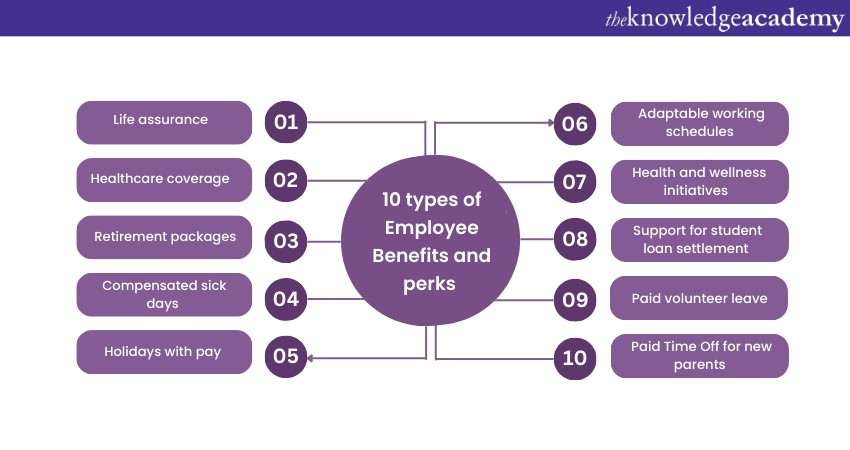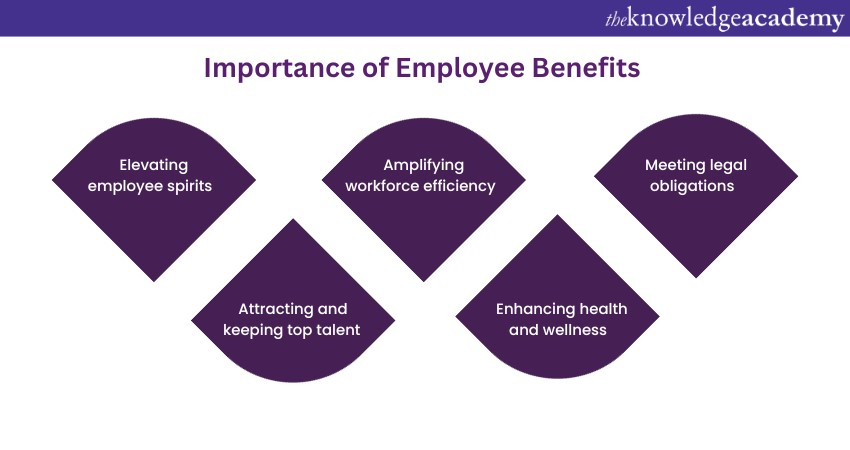We may not have the course you’re looking for. If you enquire or give us a call on + 1-866 272 8822 and speak to our training experts, we may still be able to help with your training requirements.
Training Outcomes Within Your Budget!
We ensure quality, budget-alignment, and timely delivery by our expert instructors.

In today's dynamic job market, employee benefits have evolved into a fundamental component of a competitive compensation package. What are Employee Benefits, you ask? They contain a diverse array of offerings, from essential insurance to enticing perks that significantly impact talent acquisition and staff retention.
A comprehensive Employee Benefits package is like a finely crafted mosaic. Every component improves the overall attractiveness of the position to new applicants and ensures the commitment and happiness of present employees. However, if your organisation does not have one, it is time you get familiar with this approach to drive organisational growth.
So, wait no more, and read this blog. This blog delves into the diverse forms of Employee Benefits, from the obligatory to the innovative and explores their significance in the contemporary employment landscape.
Table of Contents
1) Meaning of Employee Benefits
2) Why do employers offer benefits to employees?
3) 10 Types of Employee Benefits and perks
4) Importance of Employee Benefits
5) Conclusion
Meaning of Employee Benefits
Employee Benefits, such as paid time off, retirement savings, are non-cash provisions of the remuneration package that may come at a cost to the company. Employers may offer benefits for moral reasons, aiming to care for employees' well-being. However, these benefits can also serve business goals by supporting recruitment and promoting alignment with organisational goals.
Employee benefits vary significantly depending on the organisation, industry, and the specific preferences and priorities of the workforce. Some companies may offer a comprehensive package that includes healthcare benefits, retirement plans, paid time off, and professional development opportunities.
Others may focus on creating a unique workplace culture with perks like free meals, on-site fitness facilities, or pet-friendly policies. The goal is to provide employees with additional value beyond their basic salary, enhancing job satisfaction and ultimately attracting and retaining top talent.
Why do employers offer benefits to employees?
Employers offer benefits to employees for the following reasons:
a) First, it helps in attracting in the top applicants by offering attractive salary packages.
b) Second, Employee Benefits increase engagement through providing value beyond money and encouraging commitment and dedication.
c) Third, Employee Benefits help businesses to stay competitive in the job market. Offering benefits generally shows a business's commitment to the well-being and success of its employees, which improves involvement and motivates them.
10 Types of Employee Benefits and Perks
Review the following list to gain insights into which Employee Benefits are of utmost importance to you:

1) Healthcare coverage
Health insurance, which often forms an integral part of employment benefit packages, provides dental, vision, and health insurance. This widely prevalent benefit at work allows employees' ability to obtain essential medical care, boosting their overall well-being and health. Regular check-ups, certain medical treatments, diagnostic tests, and prescribed drugs are usually covered by medical insurance.
2) Retirement packages
In certain comprehensive employment benefits packages, companies extend offerings related to retirement planning and financial security. These programmes aim to help employees prepare for their post-employment years. Retirement plans and matching programmes are often included in these packages.
Retirement accounts and other specialised savings accounts are often set up as part of retirement plans. The employer's commitment to match the amount of employee contributions is what makes these plans especially attractive. This helps speed up the process of building retirement savings considerably and gives employees an excellent reason to save for the future.
An important aspect is that employees usually retain full ownership and control over their retirement accounts. Even if they decide to transition to a different job or company, the retirement savings they've accrued remain with them. This portability offers security and flexibility in managing one's financial future.
Elevate your HR expertise with our Certified HR Advisor Training – empower your career today!
3) Compensated sick days
Companies understand how important it is to keep their employees happy and productive. Many companies include paid sick leave in their Employee Benefits package to promote the health of their employees. A helpful policy that enables employees to take time off with pay when they are ill and unable to do their jobs well is paid sick leave.
Normally, paid sick leave policies grant employees a specific number of paid days off for illness-related absences. These paid days ensure that employees can focus on their recovery without the financial burden of lost income.
Furthermore, encouraging sick employees to stay home helps prevent the spread of illnesses within the workplace, safeguarding colleagues' health. Paid sick leave is usually offered in addition to other paid time off options, such as paid holidays or extended leaves. This inclusive approach to time off ensures that employees have the flexibility to address various personal and health-related needs while maintaining their financial security.
4) Holidays with pay
Paid holidays are a widely appreciated component of an employee's benefits package. When you join a company, you often become eligible for Paid Time Off (PTO), which includes paid holidays. You accrue paid time off hours based on your working hours and pay period when you take paid holidays. After that, you can use these accumulated hours to take time off for relaxation or other reasons.
The accumulation of paid holiday hours typically aligns with your work schedule and company policies. The exact amount of PTO you can accumulate may vary depending on your organisation's preferences, but it's common to accrue at least one week of holiday PTO each year. Paid holidays not only provide employees with a well-deserved break but also contribute to a healthy work-life balance.
5) Adaptable working schedules
Some companies provide their workers with flexible work hours as an extra benefit if they are productive even after leaving from the traditional 9–5 workday. Usually, this flexibility comes after a probationary period, during which you must show that you have the abilities and capacity to work on your own.
Companies may offer you more flexibility in how you manage your work by providing different types of flexible hours, like shorter shifts or more flexible schedules. The flexibility may also be in the form of remote work, whether on a full-time basis or in a hybrid arrangement that involves periodic visits to a physical office.
Remote work appeals to employees seeking a better work-life balance, the ability to spend more time with their families, and the avoidance of lengthy commutes. Employers offering remote work options may also provide reimbursements for home office equipment to support your optimal performance.
Unlock your potential as an HR leader with our Certified HR Manager Course – take the next step in your career journey!
6) Support for student loan settlement
When beginning with their careers, graduates may have to deal with student loans. Some employers provide a helping hand by providing student loan repayment options, which reduce the financial strain and free up graduates to focus on their career development.
These initiatives aim to provide support to staff members in better managing their debt from student loans. Typically, these are repayment programs which involve the employer making regular contributions toward the employee's outstanding student loans.
While they may not cover the entirety of the loan amount, these contributions significantly reduce the financial strain associated with student debt.
It's worth noting that companies hiring younger professionals and recent graduates are more inclined to provide student loan repayment plans as part of their Employee Benefits package. By offering this support, employers not only attract and retain top talent but also demonstrate their commitment to the financial well-being of their workforce.
7) Paid volunteer leave
In addition to traditional PTO, some employers extend an extra perk to their employees in the form of PTO for volunteering. This benefit encourages employees to engage in charitable activities throughout the year, contributing to their communities and noble causes.
Typically, volunteer PTO is distinct from regular PTO and employer may only allot a few days per year for these philanthropic endeavours. The introduction of volunteer PTO serves a dual purpose.
On one hand, it reflects an employer's commitment to corporate social responsibility and community involvement, fostering a positive image for the company. On the other hand, it provides employees with a valuable opportunity to pursue personal interests and passions outside the confines of their work.
This, in turn, can contribute to increased well-being, relaxation, and a refreshed mindset when returning to their regular job duties. As a result, volunteer PTO not only benefits the community but also enhances the overall job satisfaction and performance of employees.
8) Paid Time Off for new parents
Parental leave is one important Employee Benefits. After a child is born or adopted, employers provide this benefit to new parents so they can spend time caring for and nurturing their growing family.
Depending on the employer's policies, parental leave may last anytime from a few weeks to several months. This time allows parents to give important assistance during the crucial early stages of parenthood.
When parental leave includes compensation, it becomes particularly valuable, ensuring that employees can fully engage in their new parental role without financial concerns or work-related stress. As such, paid parental leave is a significant asset for employees who plan to expand their families and desire the flexibility to spend essential bonding time with their children without compromising their careers.
9) Mental health and well-being support
The support services offered by health insurance vary based on the size of your company. They may include help in creating a plan for the well-being of employees, offering employee assistance, counselling, and self-care techniques.
Most employers provide online or virtual physician services. Because they allow employees to receive medical advice at a time that works with their other responsibilities, these can help employees feel less stressed.
10) Employee discount scheme
Employee discount schemes help people save money on everyday essentials. This results in less financial stress for workers and better attention to their well-being. Companies can provide employees the chance to purchase goods and services at a lower cost by setting up an employee discount scheme.
Kickstart your HR career with our HR Course – essential knowledge for aspiring HR professionals!
Importance of Employee Benefits
Let's delve deeper into the five key aspects that underscore the significance of Employee Benefits:

1) Elevating employee spirits
Workers are more likely to be engaged and motivated if they see that their employers value, care for, and support them. Giving Employee Benefits makes employees feel valued. From the employee's perspective, these Employee Benefits reflect the company's recognition of their dedication and commitment.
2) Attracting and keeping top talent
Attracting and retaining top talent is a perpetual challenge for employers. Prospective employees have more choices than ever, and offering competitive benefits is a strategic imperative. Job seekers actively seek positions that not only align with their skill sets and career goals but also provide comprehensive packages of perks and advantages. In such a context, businesses presenting a compelling suite of benefits have a distinct advantage. Such Employee benefits not only catch the eye of potential candidates but also play a crucial role in retaining existing employees, reducing turnover rates, and ensuring a stable and skilled workforce.
3) Amplifying workforce efficiency
Motivated, healthy, and happy employees are inherently more productive. By offering comprehensive benefits, employers invest in their workforce's physical and mental health, ultimately yielding higher productivity levels. When employees feel secure and supported, they are more likely to concentrate on their tasks, generate creative solutions, and contribute positively to the workplace. For example, reduced stress levels and access to healthcare can mitigate health-related absenteeism, while wellness initiatives can bolster energy and resilience.
4) Enhancing health and wellness
The welfare and health of employees are cornerstones of organisational success. Employee benefits are crafted with this in mind, focusing on enhancing well-being and maintaining health. A myriad of benefits contributes to this aspect, ranging from comprehensive health insurance plans and wellness initiatives to access to gym memberships. Health insurance is pivotal in ensuring employees can access the healthcare they need without shouldering the entire financial burden. Wellness programs, on the other hand, actively promote a healthier lifestyle, offering preventive healthcare measures and resources for managing stress and improving mental health.
5) Meeting legal obligations
The law mandates certain benefits that employers must provide to their workforce. These include critical components such as workers' compensation and unemployment insurance. Complying with legal requirements is essential not only to prevent legal consequences but also to ensure that a business can continue to attract and retain talent. Non-compliance with legal requirements can lead to costly legal repercussions. Additionally, potential employees may be deterred from joining an organisation that does not adhere to these basic obligations.
Elevate your HR skills with our comprehensive HR Courses – empower your career and drive organisational success!
Conclusion
Hopefully, this blog was able to inform you about what Employee Benefits are and the various forms in which they exist. Organisations are not obliged to provide all or even most of them to their employees. However, owing to the vital role these benefits play in employee retention and organisational productivity, employees should have no hesitation in demanding these benefits.
Discover Ethics in Workplace Training – join now for a more ethical workplace!
Frequently Asked Questions

In the Employee Benefits package, several insurance policies are worth including health, life, dental and disability insurance.

Yes, offering these Employee Benefits, including insurance coverage, shows that you care about the health and well-being of the employees.

The Knowledge Academy takes global learning to new heights, offering over 30,000 online courses across 490+ locations in 220 countries. This expansive reach ensures accessibility and convenience for learners worldwide.
Alongside our diverse Online Course Catalogue, encompassing 17 major categories, we go the extra mile by providing a plethora of free educational Online Resources like News updates, Blogs, videos, webinars, and interview questions. Tailoring learning experiences further, professionals can maximise value with customisable Course Bundles of TKA.

The Knowledge Academy’s Knowledge Pass, a prepaid voucher, adds another layer of flexibility, allowing course bookings over a 12-month period. Join us on a journey where education knows no bounds.

The Knowledge Academy offers various HR Trainings, including Certified HR Advisor, Certified HR Manager, Employment Law Training, Digital Transformation in HR Training and Business Ethics Course. These courses cater to different skill levels, providing comprehensive insights into Employee Benefits.
Our Business Skills Blogs cover a range of topics related to HR courses, offering valuable resources, best practices, and industry insights. Whether you are a beginner or looking to advance your HR skills, The Knowledge Academy's diverse courses and informative blogs have you covered.









 Top Rated Course
Top Rated Course




 If you wish to make any changes to your course, please
If you wish to make any changes to your course, please


